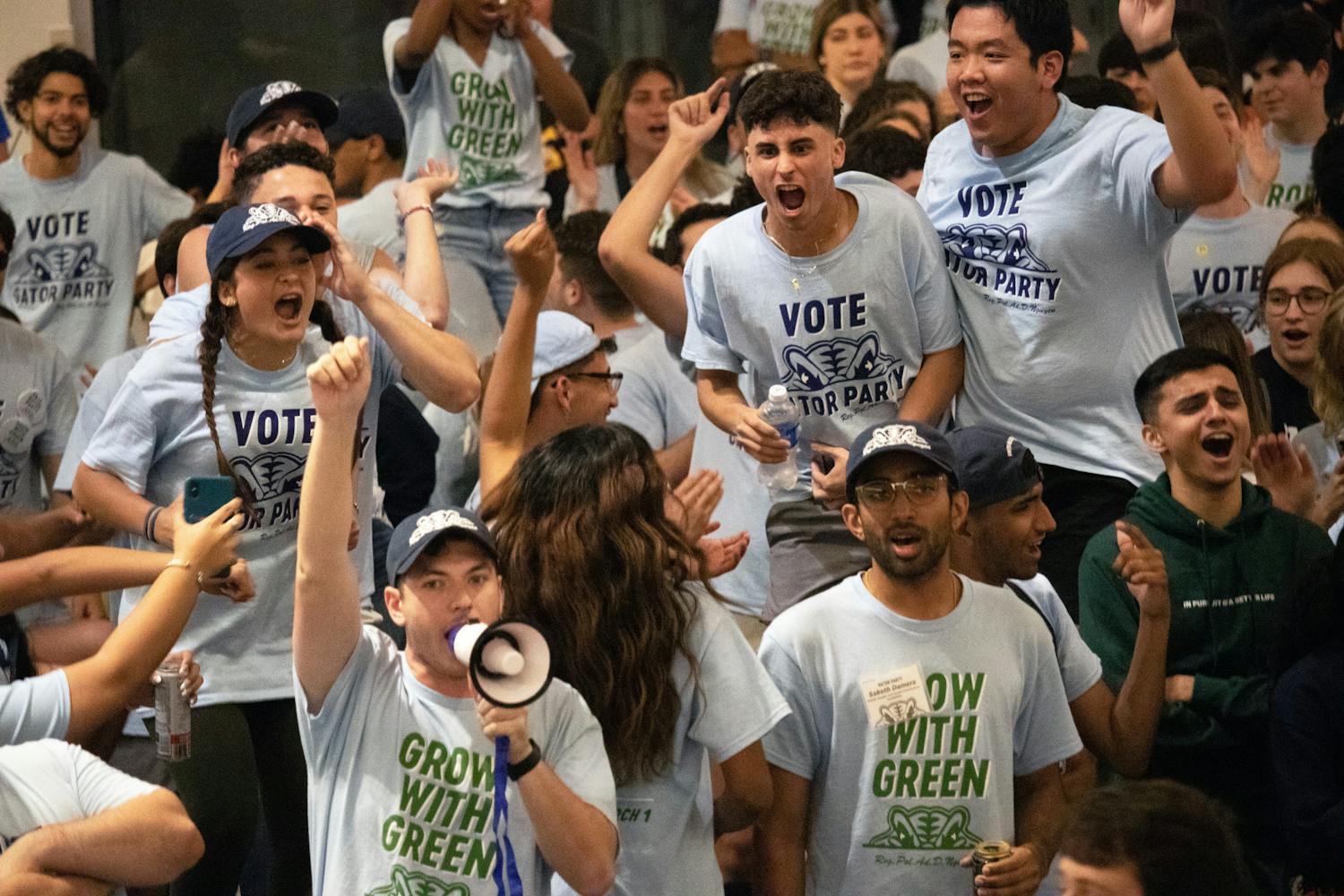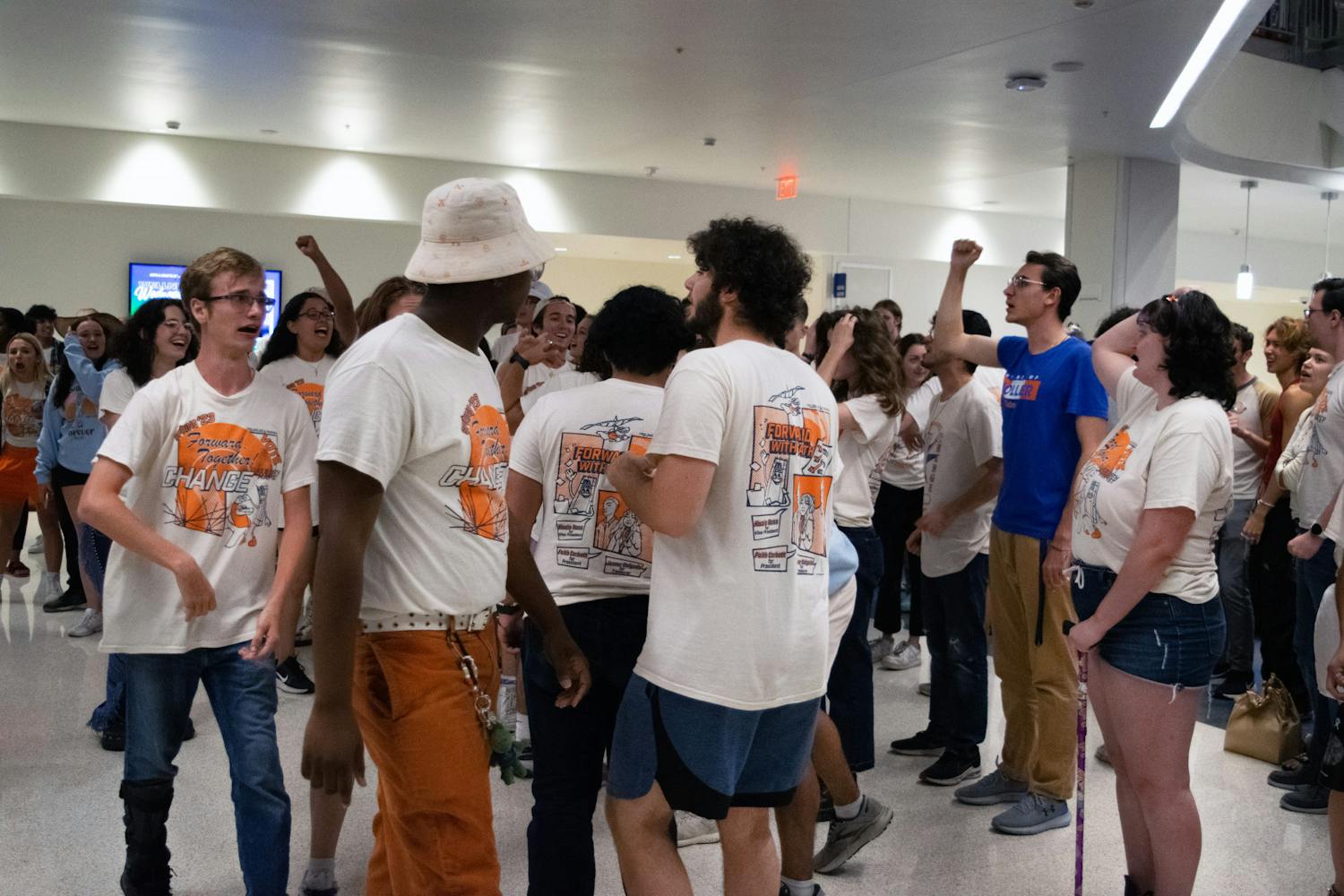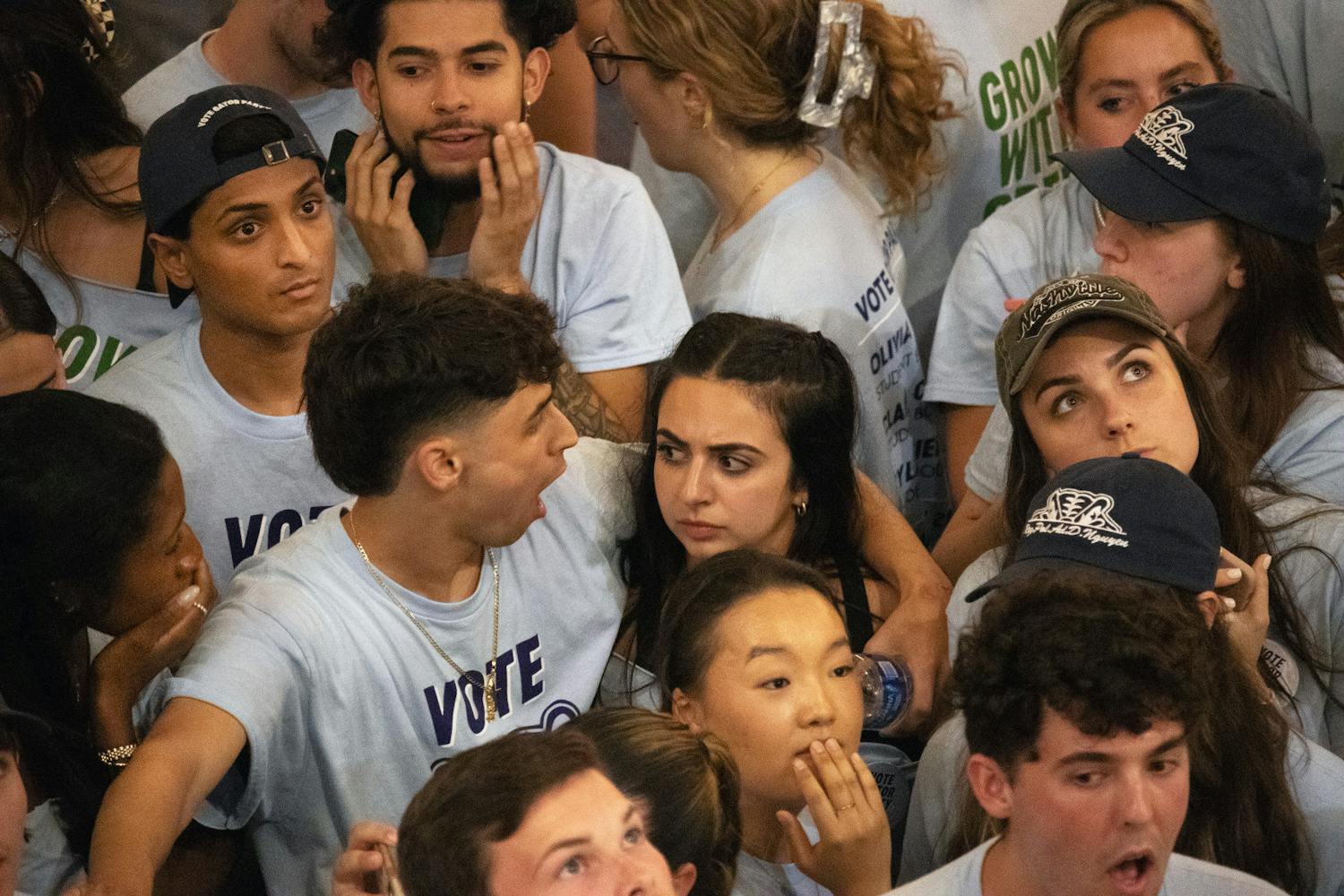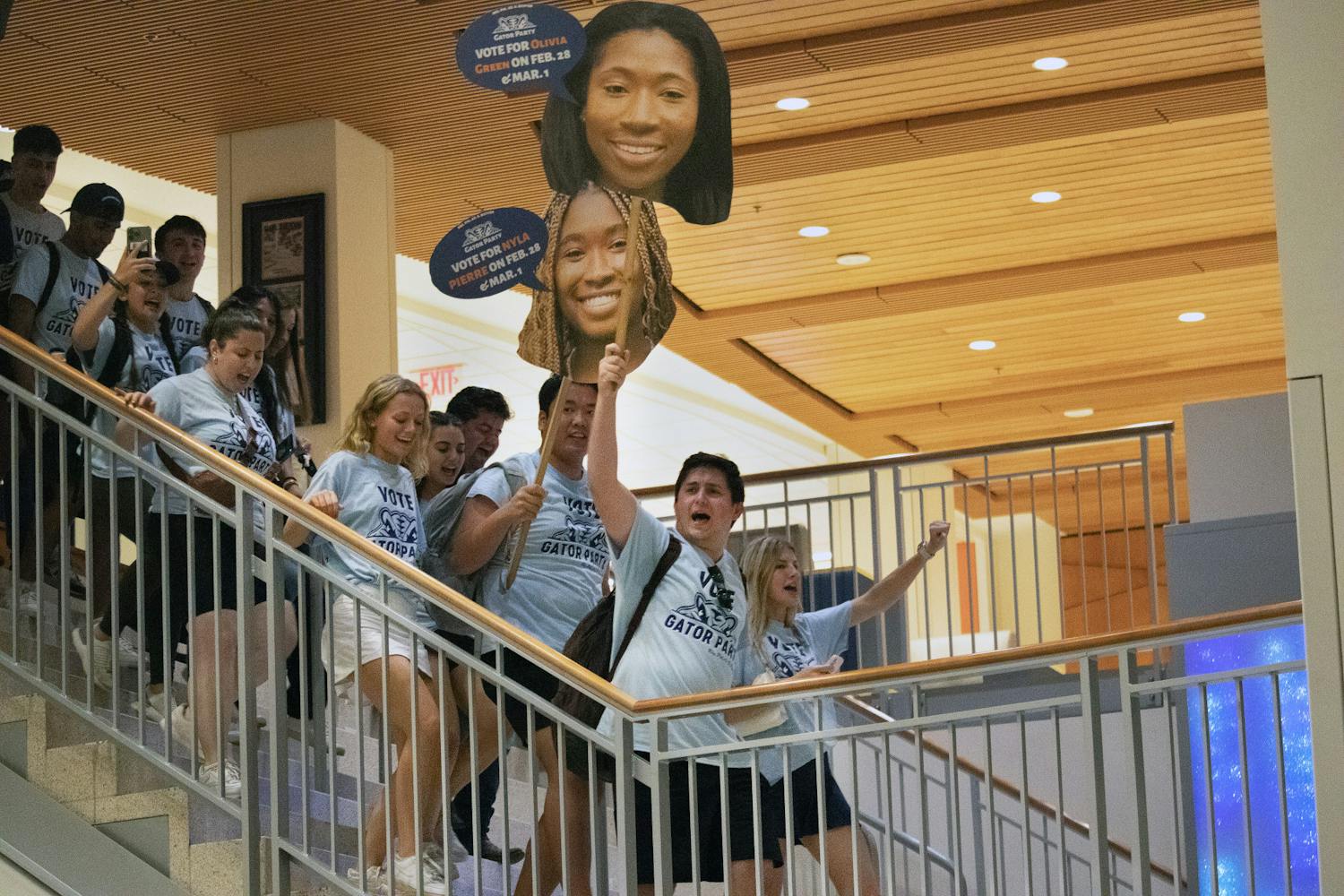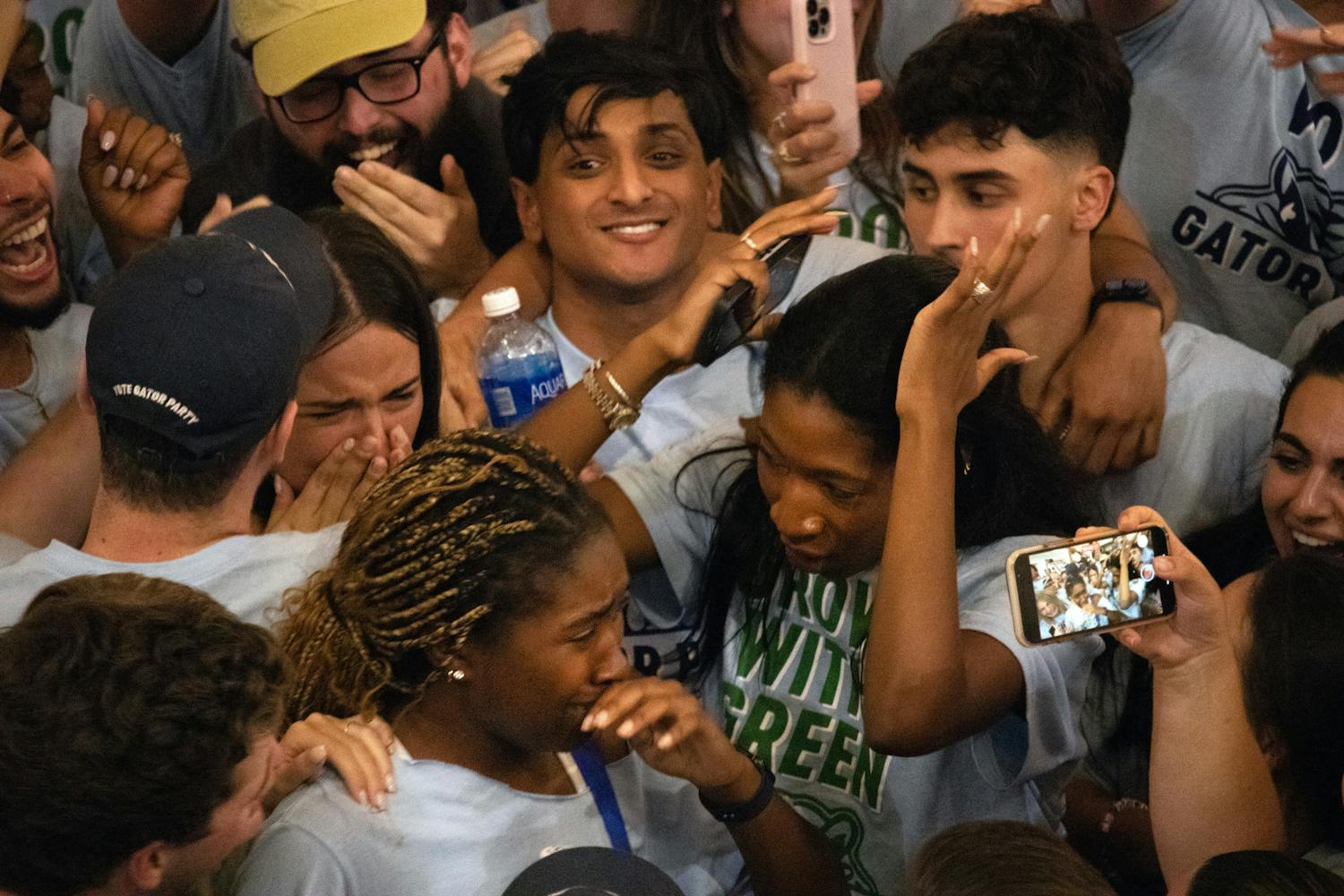Candidates, canvassers and campaign managers gathered at the ground floor of the Reitz Union, their excited chatter hushing as Supervisor of Elections Ethan Halle approached the second floor balcony Wednesday night.
Both Student Government parties could justify their exuberance as the Gator Party swept the executive ticket while the Change Party flipped the Student Senate in the largest turnout for an SG election since 2015.
Gator won the executive ticket with Olivia Green as president, Clara Calavia as vice president and Nyla Pierre as treasurer. In the Senate, Change won 30 seats, Gator won 19 and a non-party affiliated write-in candidate won a seat as well.
Change now holds 51 seats in Senate, therefore achieving a majority.
Awaiting for the election results, on the left side of the Reitz ground floor, Gator fiercely waved cardboard heads of its executive ticket in the air while chanting: "G-A-T-O-R, Gator Party — that’s who we are."
On the right, Change responded to the cheers of its opponents with one of its own: "Forward together, Change forever."
While Faith Corbett, student body presidential candidate for Change and former minority party leader didn’t win her election, she doesn't consider it a loss. She feels the executive candidates put up a good fight, she said.
Going forward, she said, with tears in her eyes, she’s focused on the future of Change.
"I don't think the executive ticket is going to be ready for a Change majority," she said. "There are no bounds to Change."
Calavia is thrilled her party's hard work resulted in Gator taking the executive branch, she said. She hopes to prove to those who didn’t not vote for Gator that her ticket is best suited for the job.
"You will not be disappointed," she said. "Olivia, Nyla and I are the most hardworking people you will find at UF. I hope to make everyone proud."
An amendment that proposed swapping “his/her” pronouns for “their” in the UF Constitution failed, with 7,246 voters who abstained or voted no.
Voters turned in their ballots from all corners of campus — and for a variety of different reasons.
Paula Berio, a 22-year-old UF sociology junior, said her decision to vote for Change was more about its opponents. After reading a recently uploaded Reddit thread about Gator’s unethical tactics for gaining votes, she said she became committed to voting for the other party.
The thread features a comprehensive list of allegations against Gator. Accusations included voter coercion through Greek life, mishandling of SG funds, failure to pass legislation in support of the LGBTQ community and sexual assault prevention and refusal to take accountability for wrongdoings.
“It’s not like I knew a lot about Change, but I knew I didn’t want [Gator Party],” she said. “It’s like the lesser of two evils kind of thing.”
Some voters cast their ballots while keeping in mind recent attacks on higher education — such as Gov. Ron DeSantis’ audits of gender-affirming care and diversity, equity and inclusion efforts at Florida universities, as well the proposal of HB 999.
Amirah Elmahdi, a 21-year-old UF sociology junior, voted for Change because of its focus on inclusivity compared to Gator, she said.
Elmahdi, who is pursuing a minor in women’s studies, said DeSantis’ efforts to reverse DEI initiatives in Florida influenced her to vote for Change. Additionally, Student Body President Lauren Lemasters' vote to approve Ben Sasse as UF's new president made her concerned about giving Gator her vote.
“Everything DeSantis is trying to propose greatly impacts my major,” Elmahdi said. “[Gator Party’s] support of Ben Sasse definitely made me stray away from them.”
Rory Ramirez, a 20-year-old UF sociology sophomore, recently changed his major from construction management to sociology. He fears eliminating DEI initiatives would take away certain topics of study in the sociology major, he said.
Ultimately, though, Ramirez voted to fulfill a requirement for his fraternity, Kappa Alpha Order.
“I voted Gator because I knew them as Greek affiliated — they supported Greek life,” Ramirez said. “I voted because of that reason solely.”
Cyril Bennett-King, a 21-year-old UF psychology junior, said his identity as a transgender student played a role in his decision to vote for Change.
“Having people that are going to have my back in Student Government…when we’re in a scary time outside of UF, was a big part of my vote,” he said.
Others were less informed on SG, voting either because of their Greek life membership or not at all.
Carly Johnecheck, a 19-year-old UF mechanical engineering freshman, said she doesn’t know much about SG elections but voted for Gator to support her Sigma Kappa sorority sisters who are members of the party.
“[SG leaders] help the students be a part of the community and help other students,” Johnecheck said. “I’d like to learn more about them as I get more involved in UF.”
Nathan Lontz, a 21-year-old UF digital arts and sciences student, has never voted in an SG election. Wednesday was no different.
“This is honestly the first time I’ve heard about it,” Lontz said. “I’m quite the unknowledgeable participant here.”
The polling location at the UF Levin College of Law wasn’t only a destination for law students, but also for undergraduates looking to avoid the crowds. Around 300 people voted at Levin Tuesday, and around 150 had voted by 4 p.m. Wednesday, a poll worker said.
Second-year law student Adreanne Martinez said she decided to vote for Change because she thinks it’s more involved with writing resolutions.
Martinez, 25, wasn’t part of SG while getting her UF undergraduate degree, but she was involved in drafting resolution 2020-1028, which requested UF assemble a group dedicated to researching and raising awareness of UF's connections to slavery. That showed her the importance of voting for people who would be active in representing her, she said.
“I tend to gear more towards the underdogs,” Martinez said.
Specific platform points, such as those relating to 24-hour services on campus, informed some students’ votes.
Tristan Carrasquilla, an 18-year-old UF business administration freshman, voted for Gator after his friends told him to. He hopes Gator will find a way to open Southwest Recreation 24 hours a day — something Change promised in its platform. He almost didn’t vote based on wait times, he said, but decided to between his classes.
“I just need to get into the habit of voting,” Carrasquilla said.
Carrasquilla consistently avoids speaking with Gator or Change representatives who are tabling in Turlington, but his girlfriend often makes him stop to speak with them, he said.
Grace Denault, a 19-year-old UF biomedical engineering sophomore, mostly voted for Gator. She served as a Gator senator for District C last Spring and Summer semesters and said the party is important to Greek life.
She supported 24-hour libraries and the failed amendment to replace “him/her” with “their” in bylaws to be more inclusive — two Change initiatives. Denault sees Gator being more involved than Change Party, she said.
“I’ve only seen Gator Party advertised,” she said. “That’s the only reason I also think [Gator Party] would maybe do more, because they take the time to advertise.”
She has voted at every SG election since arriving at UF, she said.
“You have a say in what happens within your school, and you have a voice,” she said. “You kind of feel like you’re making a change as well.”
But for others, the intricacies of SG still remain a mystery.
Lucy Parrucci, an 18-year-old UF freshman accounting freshman, wasn’t sure if she would vote by the end of the election cycle because she was confused about what each party stood for.
“I just know there’s the Gator Party and there’s the Change Party,” she said.
Amanda Friedman, Alissa Gary, Sophia Bailly, Ella Thompson, Peyton Harris, Halima Attah and Siena Duncan.



